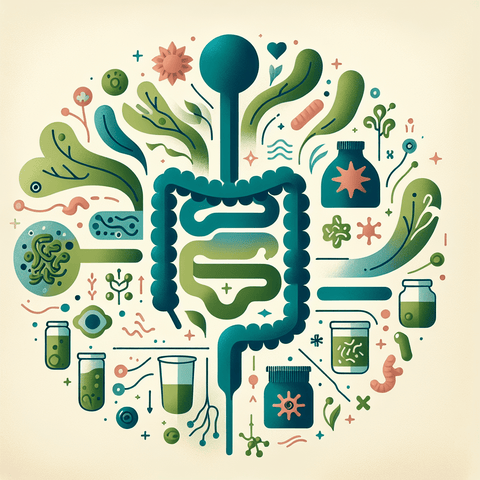Introduction
In recent years, probiotics have surged in popularity within the wellness community. Whether it's in the form of yogurt, fermented drinks, or dietary supplements, these live microorganisms have become a staple in health conversations. Their increasing prominence is not merely a trend—it's backed by a growing body of scientific research highlighting their potential to support various aspects of human health. As science continues to uncover the intricate connections between gut flora, immunity, digestion, and overall health, probiotics are being recognized as key players in the nutritional supplement world.
But what exactly are probiotics, and why are they considered beneficial? Probiotics are live, beneficial microorganisms that, when consumed in adequate amounts, confer a positive effect on the host’s health. They work primarily by enhancing the diversity and function of the gut microbiome, which is involved in more than just digestive health. It impacts immune response, mental well-being, metabolic function, and even mood regulation.
This article intends to provide a comprehensive overview of probiotics and their potential to improve health. From digestive support and immune boosting to microbial balance and long-term intestinal wellness, we will explore the science-backed benefits of probiotic supplements and their place in a holistic health regimen. We will also discuss practical tips for choosing effective probiotic supplements and how to incorporate them into your diet for optimal results.
1. Understanding Probiotics in Nutritional Supplements
Probiotics are defined as live microorganisms that, when administered in appropriate doses, confer a health benefit on the host. They are often referred to as “good” or “friendly” bacteria due to their positive impact on gut flora. Unlike pathogens, probiotics work in synergy with the body to enhance various physiological functions.
The most common probiotic strains used in nutritional supplements include species from the Lactobacillus and Bifidobacterium genera, as well as yeasts like Saccharomyces boulardii. Each strain exhibits unique properties and benefits. For instance, Lactobacillus rhamnosus GG and Bifidobacterium lactis are known to support digestive health and immune function, while Saccharomyces boulardii has been shown to help maintain gut barrier integrity during instances of antibiotic use.
Probiotic supplements are available in a variety of forms to suit different preferences and dosing requirements. These include capsules, tablets, powders, and even liquid forms. The form chosen often influences the viability and delivery of live microorganisms to the gut. Many high-quality supplements are designed to survive stomach acid and reach the intestines intact, where they interact with the existing microbiota.
Scientific research supports the efficacy of probiotics in modulating the gut microbiome and influencing health outcomes. Clinical studies have demonstrated that regular intake of certain probiotic strains can reduce the duration and severity of infectious diarrhea, alleviate symptoms of irritable bowel syndrome (IBS), and support immune function. This makes probiotics a versatile tool in the field of nutritional supplementation.
At Topvitamine.com, you can find a wide array of top-rated probiotic supplements tailored to various health needs. Whether you're looking to support digestion, resilience against pathogens, or general well-being, probiotics offer a natural way to help your body function optimally.
2. Gut Health: The Foundation of Well-Being
The gastrointestinal tract, home to trillions of microorganisms, plays a central role in maintaining overall health. This ecosystem, often referred to as the gut microbiome, is essential for digesting food, synthesizing nutrients, regulating immune responses, and even influencing mood and cognitive functions. Probiotics help maintain the delicate balance of this microbiome, ensuring it functions at its best.
One of the most well-documented roles of probiotics is in the prevention and alleviation of common gastrointestinal issues such as bloating, gas, and diarrhea. Probiotics can inhibit the growth of harmful bacteria by outcompeting them for resources and producing antimicrobial substances. For example, certain Lactobacillus strains produce lactic acid, which lowers the pH in the intestine and creates an unfavorable environment for pathogens.
Additionally, probiotics contribute to gut barrier integrity. The gut lining acts as a selective barrier, allowing beneficial nutrients to enter the bloodstream while blocking toxins and harmful organisms. Under conditions such as stress, antibiotic use, or poor diet, this barrier can become compromised, a condition known as “leaky gut.” Probiotics help reinforce this barrier by strengthening tight junctions between intestinal cells.
Probiotics also play a role in improving nutrient absorption, particularly for micronutrients such as vitamins and minerals. For instance, certain strains assist in the synthesis of B vitamins and vitamin K2, which is essential for bone and cardiovascular health. If you're interested in enhancing your vitamin and mineral intake, consider also exploring our range of vitamin K supplements.
Studies support the use of probiotics in various gut-related scenarios. A meta-analysis published in the World Journal of Gastroenterology concluded that specific probiotic strains significantly alleviate abdominal pain and bloating in patients with IBS. Other research has shown their effectiveness in reducing antibiotic-associated diarrhea and travelers’ diarrhea.
To maintain a healthy gut, it's advisable to incorporate probiotics into your daily routine, especially during or after periods of digestive stress. A combination of a balanced diet rich in prebiotic fiber—found in foods like onions, garlic, and bananas—and a high-quality probiotic supplement can help sustain a resilient and diverse microbiome.
3. Digestive Support: Enhancing Nutrient Digestion and Absorption
Optimal digestion ensures that the body absorbs the nutrients it needs for energy, repair, and overall well-being. Probiotics support this process by assisting in the breakdown of complex food components such as carbohydrates, proteins, and fats. Certain probiotic strains produce enzymes like lactase, which can aid individuals who are lactose intolerant by helping them digest dairy more efficiently.
The enzyme-producing capabilities of probiotics enhance the bioavailability of nutrients. This means the body can more readily absorb essential vitamins and minerals from food and supplements. For people who experience nutrient deficiencies despite adequate intake, probiotic supplementation may offer a viable solution.
Additionally, individuals with digestive disorders such as IBS, Crohn’s disease, or small intestine bacterial overgrowth (SIBO) often struggle with chronic bloating, pain, and poor nutrient absorption. Clinical studies highlight that specific probiotic strains can reduce the severity of such symptoms. For example, Bifidobacterium infantis 35624 has demonstrated promise in reducing abdominal discomfort in IBS patients.
Probiotics may also help manage food intolerances beyond lactose. By restoring balance and reducing gut inflammation, they can mitigate histamine sensitivity and gluten intolerance (though not suitable for people with celiac disease, who must adhere to strict dietary limitations). Many users report improved overall digestive comfort and fewer incidences of post-meal bloating or reflux when integrating probiotics into their routine.
Choosing the right probiotic for digestive health involves looking for multi-strain options that include both Lactobacillus and Bifidobacterium species. The ability of the strains to survive acidic stomach conditions is also crucial. It’s also useful to combine your probiotic intake with nutrients that support digestive function, such as magnesium, which plays a role in muscle functionality within the gastrointestinal tract, aiding bowel regularity and motility.
For those looking to support their digestion through supplements, exploring products that combine enzymes and probiotics can offer dual-action benefits. Integrate these into a healthy lifestyle that includes hydrating adequately, eating fiber-rich meals, and minimizing processed foods to maximize results.
4. Immune Boosting: Strengthening the Body's Defense Mechanisms
It’s estimated that around 70% of the body’s immune cells reside in the gut, making the health of our digestive system pivotal to immune function. Probiotics contribute to a robust immune defense by enhancing the gut barrier, producing antimicrobial substances, and interacting directly with immune cells like macrophages and dendritic cells to modulate immune responses.
Studies have shown that regular probiotic supplementation can reduce the incidence of acute respiratory infections, especially in children and the elderly—two populations commonly at risk. In a double-blind placebo-controlled trial published in Clinical Nutrition, elderly patients who consumed probiotics experienced fewer and less severe colds compared to the placebo group.
Probiotics also help reduce the inflammatory response during infections by balancing the activity between pro-inflammatory and anti-inflammatory cytokines. This balanced immune modulation means that probiotics don’t just amp up the immune system but help it function more accurately and effectively, potentially reducing the chances of chronic inflammatory diseases as well.
Lactobacillus casei and Lactobacillus acidophilus, for instance, are known to enhance phagocytic activity—where immune cells engulf harmful pathogens. Similarly, Bifidobacterium longum helps regulate T-cell responses and may benefit those prone to allergic reactions or autoimmune conditions.
Integrating probiotics into a comprehensive immune support regime is especially beneficial during periods of high immunity stress, such as flu season or times of travel. Combining them with other supportive nutrients like vitamin C and vitamin D, both of which are known to contribute to the normal function of the immune system, can enhance protective mechanisms.
For optimal immune support, consistency is key. Choose a trusted supplement provider like Topvitamine, ensuring products meet high-quality standards in probiotic viability and strain specificity. With regular use, probiotics can be a safe and effective way to fortify your body’s natural defenses.
5. Microbial Balance: Restoring and Maintaining a Healthy Microbiome
The balance of the gut microbiota—the trillions of microorganisms living in our digestive tract—is critical for overall health. Factors such as poor diet, stress, aging, and especially antibiotic use can disrupt this delicate equilibrium. When the balance tips in favor of harmful microbes, a state known as dysbiosis occurs, leading to health issues such as digestive dysfunction, increased infection susceptibility, and even skin disorders.
Probiotic supplementation can help restore microbial balance by replenishing beneficial bacteria. After antibiotic treatment, which often wipes out both harmful and helpful bacteria, introducing specific probiotic strains can accelerate the re-colonization of beneficial species. Research supports the use of strains like Saccharomyces boulardii and Bifidobacterium lactis to reduce the risks of antibiotic-associated complications.
Maintaining a diverse and resilient microbiome is also associated with long-term health outcomes, including better weight management, improved mood, and reduced inflammation. Diversity is the key; the more types of bacteria co-exist peacefully, the more robust the microbiome becomes. Probiotics help stimulate this diversity by crowding out pathogenic bacteria and supporting stable ecological niches within the gut.
Probiotic strains can be selected based on target needs, as personalized microbiome care becomes increasingly viable. Future directions in research are now exploring how individual genetic makeup affects microbiota composition and response to probiotic interventions, making precision supplementation an emerging frontier in nutritional science.
In the pursuit of microbial balance, it's not only about adding beneficial organisms but also about feeding them appropriately. Prebiotics—fibers that serve as food for probiotics—and a varied, plant-rich diet work synergistically to support long-lasting gut balance. Explore the Topvitamine.com collection of microbiome-optimized supplements for a tailored approach to managing dysbiosis and promoting resilience.
6. Intestinal Wellness: Promoting Long-Term Digestive and Overall Health
True wellness begins in the gut. Intestinal wellness refers not only to the absence of disease but to the optimal functioning of systems related to digestion, nutrient absorption, elimination, and immune responsiveness. A balanced gut not only digestively benefits you, but it also influences your cognition and emotional state, due to the gut-brain connection via the vagus nerve and neurotransmitter production.
Probiotics support this holistic health model by aiding regular bowel motility, reducing chronic inflammation, and supporting certain mental health parameters. Increasing evidence points to the potential of probiotics in managing chronic inflammatory bowel diseases (IBD), such as ulcerative colitis and Crohn’s disease. Although more research is necessary to confirm their wide-scale utility, certain strains have illustrated promise in reducing flare-ups and maintaining remission.
Integrating probiotics consistently can also alleviate symptoms of constipation, especially in older adults or sedentary individuals. Regular colon motility ensures waste and toxins don’t accumulate, further aiding detoxification processes in the body.
For long-term health, using a combination of probiotics with complementary nutrients—such as vitamin D or magnesium—creates a robust internal ecosystem. These nutrients support nerve and muscle function, immune modulation, and energy production, which are closely tied to digestive health.
Wellness is not achieved overnight. It requires consistent behaviors, including consuming probiotic-rich foods, reducing processed sugars, managing stress, and including high-quality probiotic supplements in one’s daily routine. Topvitamine.com offers curated probiotic products designed with scientifically validated strains for different life stages and needs, ensuring that your path to wellness begins with quality.
Conclusion
Probiotics offer a powerful, natural means of supporting numerous areas of health through their multifaceted roles in digestion, immunity, and microbial balance. With clinical evidence backing their use across a range of concerns—from managing bloating to boosting immune resilience—they stand as essential tools in the world of nutritional supplementation.
It's vital to choose high-quality probiotic products that align with your specific needs. Strain specificity, viability, and formulation type all influence efficacy. Always consult a healthcare professional before beginning any new supplement regimen, especially if you have underlying health conditions or are on medication.
Incorporating well-chosen probiotics into your daily wellness routine may be one of the most impactful steps toward sustained digestive health and holistic well-being. Begin your journey to better health with trusted, scientifically backed products from Topvitamine.com.
Q&A Section
Q: What are probiotics and how do they work?
A: Probiotics are live beneficial microorganisms that support gut health, immune function, and digestion, primarily by maintaining microbial balance in the gastrointestinal tract.
Q: Can probiotics help with bloating and gas?
A: Yes, many probiotic strains such as Lactobacillus and Bifidobacterium alleviate symptoms like bloating, gas, and diarrhea by improving microbiome balance and digestive efficiency.
Q: Are probiotics safe for long-term use?
A: For most people, probiotics are safe and well-tolerated for long-term use. However, it's advisable to consult a healthcare professional prior to beginning prolonged supplementation.
Q: Do I need to refrigerate my probiotic supplements?
A: Some probiotic supplements require refrigeration to maintain viability, while others are shelf-stable. Always check the product label for storage instructions.
Q: When should I take probiotic supplements?
A: Probiotics are often recommended to be taken on an empty stomach or before meals, but exact timing may vary based on the strain and formulation.
Important Keywords
- probiotics benefits
- gut health
- digestive support supplements
- immune boosting probiotics
- microbiome balance
- intestinal wellness
- Lactobacillus
- Bifidobacterium
- nutritional supplements for gut health
- Topvitamine probiotic supplements



